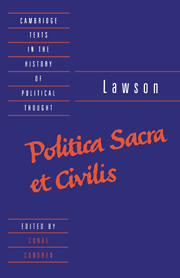Book contents
- Frontmatter
- Contents
- Preface
- Editor's introduction
- A note on the text
- Bibliographical guide
- Biographical notes
- Principal dates
- Politica Sacra et Civilis
- Epistle to the reader
- Dedicatory poem
- The arguments of the several chapters
- 1 Of government in general, and the original thereof
- 2 Of government in general, and of a community civil
- 3 Of an ecclesiastical community
- 4 Of a commonwealth in general, and power civil
- 5 Of the manner how civil power is acquired
- 6 Of power ecclesiastical
- 7 Of the manner of acquiring ecclesiastical power
- 8 Of the disposition of power civil, and the several forms of government
- 9 Of the disposition of ecclesiastical power: and first, whether it be due unto the bishop of Rome
- 10 Whether the civil state have any good title to the Power of the Keys
- 11 Whether episcopacy be the primary subject of the Power of the Keys
- 12 Whether presbytery or presbyters be the primary subject of the Power of the Keys
- 13 That the government of the church is not purely democratical, but like that of a free state, wherein the power is in the whole, not in any part, which is the author's judgement
- 14 Of the extent of a particular church
- 15 Of subjection in general, and the subjects of a civil state
- 16 Of subjects in an ecclesiastical polity
- Index
- Title in the series
1 - Of government in general, and the original thereof
Published online by Cambridge University Press: 05 June 2012
- Frontmatter
- Contents
- Preface
- Editor's introduction
- A note on the text
- Bibliographical guide
- Biographical notes
- Principal dates
- Politica Sacra et Civilis
- Epistle to the reader
- Dedicatory poem
- The arguments of the several chapters
- 1 Of government in general, and the original thereof
- 2 Of government in general, and of a community civil
- 3 Of an ecclesiastical community
- 4 Of a commonwealth in general, and power civil
- 5 Of the manner how civil power is acquired
- 6 Of power ecclesiastical
- 7 Of the manner of acquiring ecclesiastical power
- 8 Of the disposition of power civil, and the several forms of government
- 9 Of the disposition of ecclesiastical power: and first, whether it be due unto the bishop of Rome
- 10 Whether the civil state have any good title to the Power of the Keys
- 11 Whether episcopacy be the primary subject of the Power of the Keys
- 12 Whether presbytery or presbyters be the primary subject of the Power of the Keys
- 13 That the government of the church is not purely democratical, but like that of a free state, wherein the power is in the whole, not in any part, which is the author's judgement
- 14 Of the extent of a particular church
- 15 Of subjection in general, and the subjects of a civil state
- 16 Of subjects in an ecclesiastical polity
- Index
- Title in the series
Summary
Propriety is the ground of power, and power of government; and there are many degrees of propriety, so there are of power. Yet, as there is but one universal and absolute propriety, so there is but one supreme and universal power, which the most glorious, blessed and eternal God can only challenge as his due. For he contrived all things by his wisdom, decreed them by his will, and produced them by his power, and to this day ‘worketh all things according to the counsel of his will’ (Eph. 1.11). In this respect he is ‘worthy to receive glory, and honour, and power, because he hath created all things, and for his pleasure they are and were created’ (Rev. 4.11). By creation he began, by conservation he continued to be actually the proprietary of all things: for he made them of nothing, and gave them being and existence, so that they wholly always depend upon him, and are absolutely his. Therefore he hath power to dispose of them as he pleaseth, and to order them to those ends he created them. This ordination of them, which began immediately upon creation, continueth and shall continue to the end, and is either general of all things, or special of some special, more noble and more excellent creatures: such are men and angels, endued with understanding and free will, and capable of laws, rewards and punishments, both temporal and eternal. The ordination of these is more properly and strictly called government, which is a part of divine providence.
- Type
- Chapter
- Information
- Lawson: Politica sacra et civilis , pp. 15 - 21Publisher: Cambridge University PressPrint publication year: 1993



